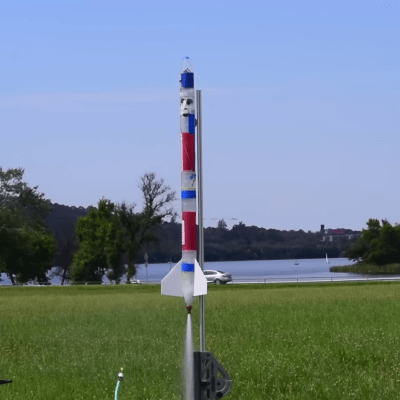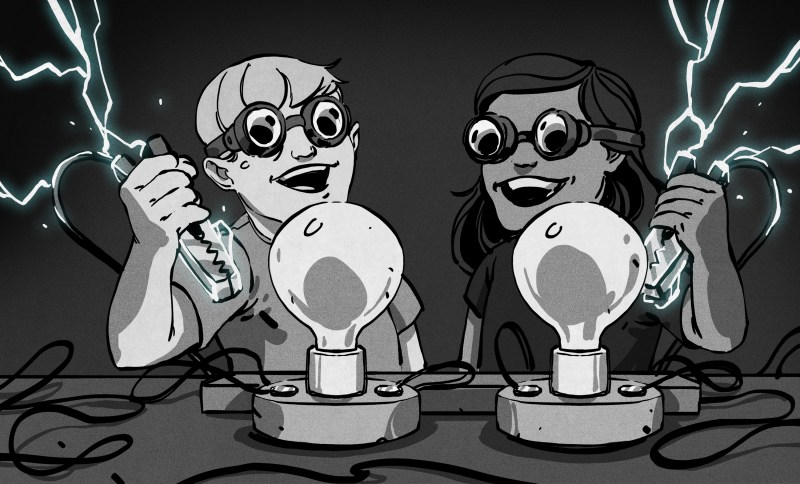When I start off on a “simple” project, experience shows that it’s got about a 10% chance of actually remaining simple. Sometimes it’s because Plan A never works out the way I think it will, due to either naivety or simply the random blockers that always get in the way and need surmounting. But a decent percentage of the time, it’s because something really cool happens along the way. Indeed, my favorite kind of “simple” projects are those that open up your eyes to a new world of possibilities or experiments that, taken together, are nothing like simple anymore.
 Al Williams and I were talking about water rockets on the podcast the other day, and I realized that this was a perfect example of an open-ended simple project. It sounds really easy: you put some water in a soda bottle, pressurize it a bit with air, and then let it go. Water gets pushed down, bottle flies up. Done?
Al Williams and I were talking about water rockets on the podcast the other day, and I realized that this was a perfect example of an open-ended simple project. It sounds really easy: you put some water in a soda bottle, pressurize it a bit with air, and then let it go. Water gets pushed down, bottle flies up. Done?
Oh no! The first step into more sophistication is the aerodynamics. But honestly, if you make something vaguely rocket-shaped with fins, it’ll probably work. Then you probably need a parachute release mechanism. And then some data logging? An accelerometer and barometer? A small video camera? That gets you to the level of [ARRO]’s work that spawned our discussion.
But it wasn’t ten minutes into our discussion that Al had already suggested making the pressure vessel with carbon fiber and doctoring the water mix to make it denser. You’d not be surprised that these and other elaborations have been tried out. Or you could go multi-stage, or vector-thrust, or…
In short, water rockets are one of those “simple” projects. You can get one basically working in a weekend day, and then if you’re so inclined, you could spend an entire summer of weekends chasing down the finer points, building larger and larger tubes, and refining payloads. What’s your favorite “simple” project?
















Back in 1967, I had physics at UCSB with Dr. Virgil Elings as the professor. We had an indoor classroom with about 50 students and the topic was momentum. Dr. Elings brought out a simple toy rocket, pumped it with air , released and it shot up about 2 feet, falling to the floor. Then, he filled it about half way, attached and pumped again. At release, it hit the ceiling and got everyone in the class partly soaked, including him. His momentum explanation was unforgettable, I think it was at 8 a.m.
Sounds like my science teacher in High School. Took us all outside and dropped sodium in a soup pot of water and put the lid on it. Curriculum can’t ensure the teacher is enthusiastic about their subject.
I particularly like the Tech Ingredients series on youtube with the mad professor that made his own thermal paste with superior transfer to many commercial paste, simply by purchasing metals ground into smaller and smaller powders to fill the most dead space, mixing them in an oil and he even sells it! Best part is he explains the entire process and theory, so you can make your own “good enough” to “possibly the best” paste if you feel like.
> Tech Ingredients series on youtube with the mad professor
More like a surgeon.
It’s the “what if” that causes feature creep. Hundred Cub scouts were perfectly happy using just a 1 liter water bottle, getting wet on a hot day and watching physics in action
“and doctoring the water mix to make it denser.”
So, we’ll be reading about your Heavy Water experiments?
B^)
The first rule about heavy water experiments is that nobody discusses the heavy water experiments.
Spoiler: The experiments I’ve seen have included adding dish soap or rice.
The page font makes “Al” (with a lower-case “L”) look like “AI” (with an upper-case “i”) and briefly I thought Elliot had a podcast where he’s chatting with Chat GPT. Unless…is Al actually an AI?
Sans serif fonts are miserable that way. Apologies. I snuck in and fixed it.
Al, AI, A1. At least one of them looks different. Of course, it’s the one that’s easiest to disambiguate from context. Thanks, Helvetica.
“… experience shows that it’s got about a 10% chance of actually remaining simple.”
As a home experimenter who has published online (forums, etc.) more than 50 personal projects in the past 10 years, I do not find the “10% chance” is representative of my style. Looking around my basement lab, I only count maybe 3 personal projects that took more than a weekend or two:
– GPS clock with Graphing 48 hour barometer
– A rPi streaming radio with Arduino joystick vol/chn/mute joystick control
– Magic Morse code trainer
Now, the worst creeping scope project I worked on was an engine monitor for an experimental aircraft. What started out to be a simple design coded in a weekend, went on-and-on for years. In hindsight, I was doing only the design, coding, and prototyping while the aircraft builder was managing the circuit board production, sensor wiring, power distribution, etc. The collaboration seemed reasonable in an Internet connected world, but the reality is code is actually a small part of most projects.
– Lab prototypes rarely act the same in a non-controlled environment
– Never believe napkin notes, especially if Margaritas are concerned
– LCD displays suck in sunlight, OLED is a godsend
– Never underestimate electrical/RF noise
– My idea of reasonable co$t may not be reasonable to the end-user
– Expectations VS reality